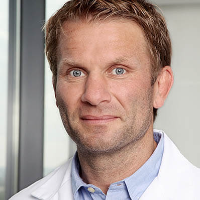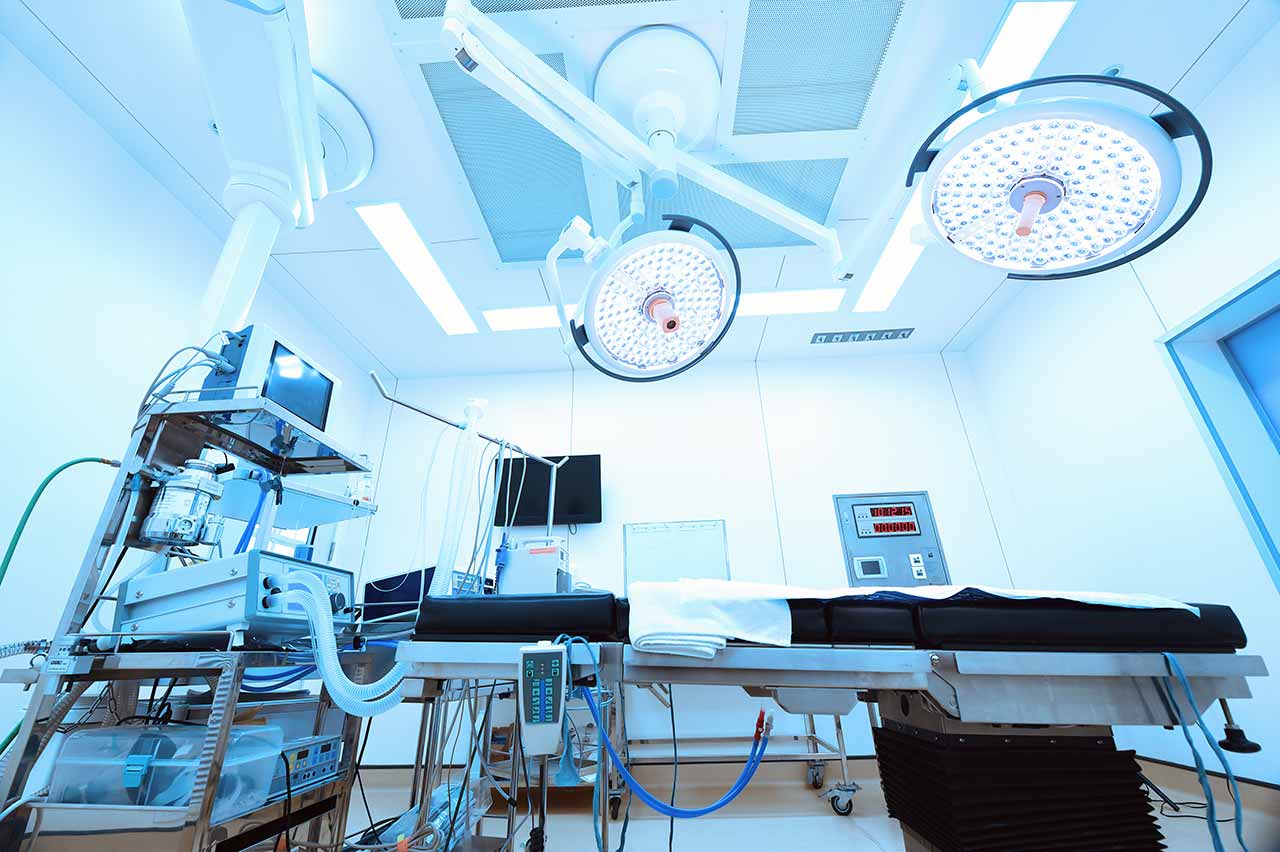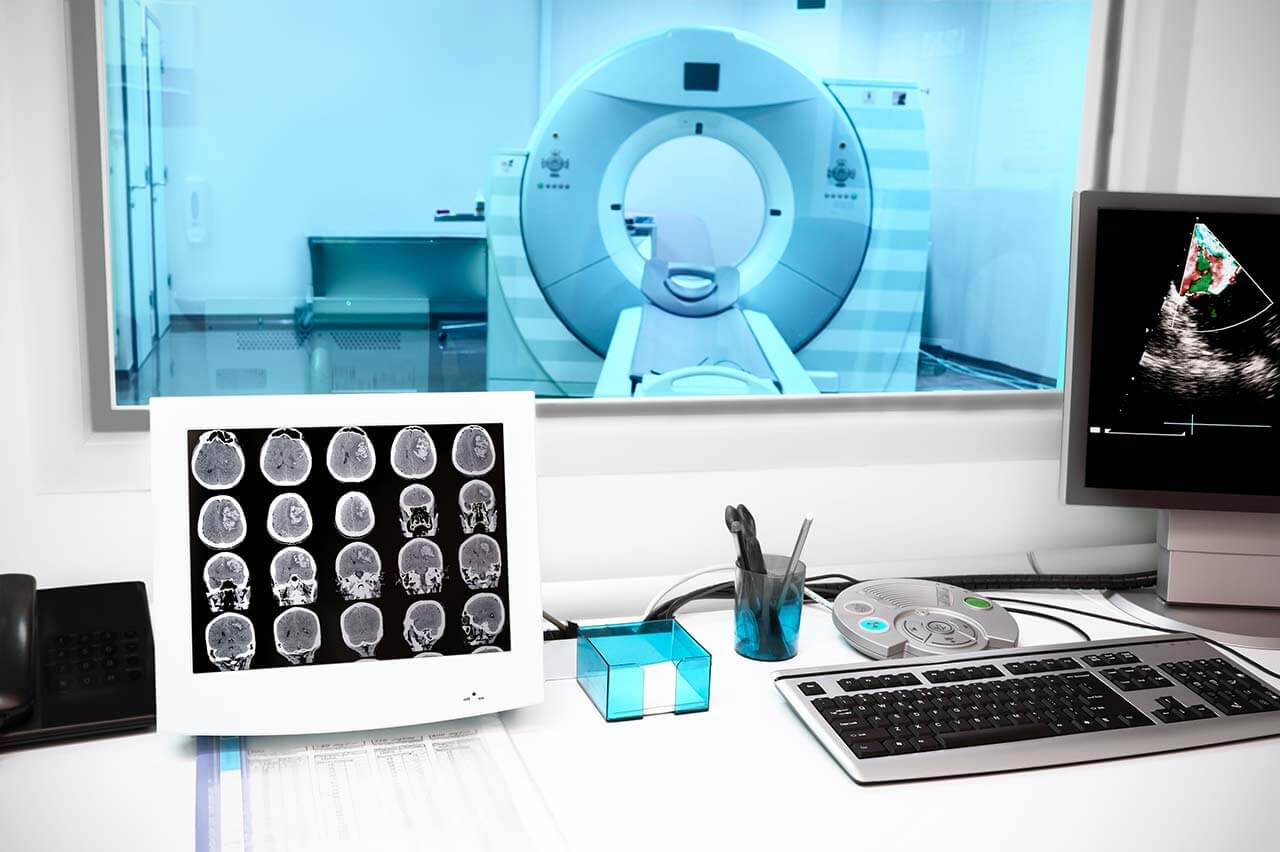
The program includes:
- Initial presentation in the clinic
- clinical history taking
- review of medical records
- physical examination
- blood chemistry test
- gynecological examination:
- transvaginal ultrasound
- pelvic ultrasound
- colposcopy
- vaginal swab
- nursing services
- services of all leading experts
- explanation of individual treatment plan
Required documents
- Medical records
- Pelvic ultrasoud (if available)
- Pelvic MRI/CT scan (if available)
Service
You may also book:
 BookingHealth Price from:
BookingHealth Price from:
About the department
The Department of Gynecology, Mammology and Obstetrics at the Hospital zum Heiligen Geist Frankfurt am Main provides the widest range of preventive, diagnostic and therapeutic services at the highest level of modern medicine. The priority fields of the department's clinical activities include the treatment of oncological diseases of the female reproductive system and breast, the treatment of uterine fibroids and endometriosis, medical care for urinary incontinence and pelvic organ prolapse in women. The department's team of doctors uses both conservative and surgical treatments. At the same time, the specialists of the medical facility successfully perform sparing minimally invasive surgery and endoscopic procedures for gynecologic diseases. The department also offers comprehensive obstetric services: pregnancy management in all trimesters, childbirth and postpartum care for mother and child. More than 1,000 babies are born in the department's delivery rooms annually. The entire medical staff of the department makes sure that each patient receives effective medical care in a pleasant and friendly environment. The department is headed by Prof. Dr. med. Jörg Engel.
Of particular clinical interest for the department's specialists is the provision of medical care to women with gynecologic oncological diseases: uterine, cervical, ovarian, vulvar, vaginal and fallopian tube cancers. If earlier the diseases of this spectrum were usually diagnosed in middle-aged and elderly women, now young girls are increasingly faced with oncopathology. In this regard, the department's specialists recommend to undergo regular preventive check-ups by a gynecologist, which makes it possible to exclude the presence of cancer or to detect it in the early stages, when the chances of a full recovery are quite high. The diagnostic protocol for suspected gynecologic cancer includes laboratory tests, imaging scans and invasive diagnostic procedures (hysteroscopy, colposcopy, biopsy, etc.). If the diagnostic results confirm the presence of oncology, the department's specialists begin to develop an individual treatment regimen. As a rule, the fight against gynecologic cancer begins with a surgical resection of the tumor. In the advanced stages of oncology, a radical surgical intervention may be required with the total removal of the affected organ (uterus, ovaries). With appropriate clinical indications, the department's doctors use low traumatic surgical techniques. However, a single operation is usually not enough for the full recovery, and therefore chemotherapy, immunotherapy, antibody therapy are used depending on the clinical case. The patients with end-stage stage receive palliative therapy, which allows them to get rid of the pain syndrome. In addition, women diagnosed with cancer receive professional psychological assistance aimed at getting rid of fears and normalizing their psycho-emotional state.
The department also admits patients with benign gynecologic diseases. The most common of these include uterine fibroids and endometriosis. In some cases, there is no need for specific treatment in the early stages of these pathologies, so the doctor recommends only monitoring by highly specialized doctors. If diagnostic data indicate the need to initiate therapy, then drug therapy or invasive therapeutic procedures (usually minimally invasive) may be considered.
The department's team of doctors also successfully copes with the treatment of urogynecologic pathologies: urinary incontinence and pelvic organ prolapse. During the diagnostics, the specialists resort to ultrasound and X-ray scanning, as well as urodynamic testing. Should the diagnosis be confirmed, the attending physician considers the best treatment options. Whenever possible, the doctor uses only special therapeutic exercises, drug therapy and pessary therapy. If the pathological process is in the early stage, doctors have to resort to surgical interventions through open, laparoscopic or vaginal access.
An integral part of the department's work is the diagnostics and treatment of breast diseases. In this field, special attention is paid to the treatment of breast cancer, which is one of the most common and aggressive types of cancer in women. The classical diagnostic protocol for the patients with suspected breast cancer includes an accurate clinical examination and palpation, study of the patient's medical history, ultrasound scanning, mammography, and histological examination of a biopsy sample of the suspicious breast area. The first-line treatment is tumor resection surgery. In 75% of cases, the department's surgeons perform breast-conserving surgery. In complex clinical cases, it is not always possible to preserve the patient's own breast, and therefore the resection may be followed by plastic breast reconstruction in order to restore an aesthetically attractive appearance.
The department also specializes in the provision of obstetric services. The specialists monitor the course of pregnancy in all trimesters, deliver babies, as well as take care of the mother and baby after childbirth. The department has four modern delivery rooms, equipped with everything necessary for the successful childbirth. The delivery rooms also have baths for water births. The department's obstetricians prefer natural childbirth, but if necessary, C-section may be performed. The specialists make sure that the woman in labor feels as comfortable as possible, so they use various pain relief methods, including acupuncture, homeopathy, massage, aromatherapy and others.
The department's main clinical activities include:
- Gynecology
- Diagnostics and treatment of malignant diseases of the female reproductive system
- Uterine cancer
- Cervical cancer
- Ovarian cancer
- Vulvar cancer
- Vaginal cancer
- Fallopian tube cancer
- Diagnostics and treatment of benign diseases of the female genitourinary system
- Uterine fibroids
- Endometriosis
- Urinary incontinence
- Pelvic organ prolapse
- Diagnostics and treatment of malignant diseases of the female reproductive system
- Mammalogy
- Diagnostics and treatment of breast diseases
- Breast cancer
- Diagnostics and treatment of breast diseases
- Obstetrics
- Integrated management of pregnancy
- Childbirth (natural childbirth and C-section)
- Postnatal care for mother and baby
- Other medical services
The department's therapeutic options include:
- Conservative treatment
- Drug therapy
- Chemotherapy, immunotherapy and targeted therapy for cancer
- Special therapeutic exercise programs for pelvic floor muscle strengthening and pessary therapy for urinary incontinence
- Surgical treatment
- Sparing minimally invasive surgery for gynecologic cancer and breast cancer
- Radical surgery for gynecologic cancer and breast cancer
- Reconstructive pelvic floor plastic surgery with autologous tissues or mesh implants for pelvic organ prolapse
- TVT and TOT sling procedures for urinary incontinence
- Burch colposuspension and Richardson's operation for urinary incontinence
- Laparoscopic surgery for uterine fibroids or endometriosis
- Other treatment methods
Curriculum vitae
University Education and Professional Career
- Since 2018 Head Physician of the Department of Gynecology, Mammology and Obstetrics at the Hospital zum Heiligen Geist Frankfurt am Main.
- Since 2016 Head Physician of the Department of Gynecology and Obstetrics at the Hospital Nordwest.
- 2015 - 2016 Managing Senior Physician, Department of Gynecology and Deputy Medical Director of the Hospital Aschaffenburg Alzenau.
- 2015 Extraordinary Professorship, Justus Liebig University Giessen.
- 2014 - 2015 Head of the Department of Gynecologic Oncology, Department of Gynecology and Obstetrics at the University Hospital Giessen.
- 2012 Habilitation in Gynecology and Obstetrics, University of Regensburg.
- 2011 - 2014 Senior Physician, Department of Gynecology and Obstetrics at the University Hospital Regensburg.
- 2009 Venia Legendi in Gynecology and Obstetrics, University of Wuerzburg.
- 2008 - 2011 Senior Physician, Department of Gynecology at the University Hospital Wuerzburg.
- 2008 Board certification in Gynecology and Obstetrics.
- 2005 - 2008 Assistant Physician, Department of Gynecology at the University Hospital Wuerzburg.
- 2003 - 2005 Research Fellow, Endocrine, Polypeptide and Cancer Institute, Tulane University, New Orleans, Louisiana, USA.
- 2002 - 2003 Invited Physician at the Antoine Beclere Hospital, Paris-Sud University.
- 2002 Internship, Endocrine, Polypeptide and Cancer Institute, Tulane University, New Orleans, Louisiana, USA.
- 2001 - 2002 Internship in the Department of Gynecology and Obstetrics, University Hospital Luebeck.
- 1994 - 2000 Study of Human Medicine at the Georg August University of Goettingen.
Clinical Interests
- Gynecologic oncology.
- Diagnostics of tumors of the female reproductive system.
- Surgical treatment of tumors (Senior Breast Specialists certified according to OnkoZert requirements).
- Drug therapy for tumors.
- Special gynecologic surgery.
- Endoscopic interventions.
- Treatment of urogynecologic diseases.
- Gynecologic endocrinology and reproductive medicine.
Research Interests
- AKT and ERK signal transduction pathways as a molecular target for the treatment of gynecologic tumors and breast cancer.
- New therapeutic strategies for triple-negative breast cancer.
- GnRH and GHRH receptors as prognostic factors and therapeutic targets in gynecologic oncology.
- Targeted therapy for tumors with analogues of cytotoxic peptide hormones.
- Use of GnRH antagonists in reproductive medicine.
Memberships in Professional Societies
- German Society of Gynecology and Obstetrics (DGGG).
- German Society of Ultrasound in Medicine (DEGUM).
- German Cancer Society (DKG).
- Gynecological Oncology Working Group (AGO).
- Working Group for Urogynecology and Plastic Pelvic Floor Reconstruction (AGUB).
- Working Group for Gynecological Endoscopy (AGE).
- European Endometriosis League.
Photo of the doctor: (c) Hospital zum Heiligen Geist
About hospital
The Hospital zum Heiligen Geist Frankfurt am Main is a modern medical facility offering top-class service. The medical complex is an academic hospital of the Goethe University Frankfurt, so doctors pay due attention to research activities, and also have a perfect command of the very latest diagnostic and therapeutic techniques. The hospital has state-of-the-art equipment, comfortable diagnostic and treatment rooms, as well as cutting-edge operating rooms. The medical facility provides treatment to more than 10,844 inpatients and about 14,582 outpatients every year. In addition, more than 1,157 babies are born in the hospital annually. The medical complex is highly reputable in the region and throughout the country.
The hospital has specialized departments responsible for the treatment of diseases of the gastrointestinal tract and liver, respiratory diseases, diseases of the cardiovascular system, musculoskeletal system and pathologies of the female reproductive organs. The health of patients is in the safe hands of highly professional doctors who have a perfect command of all modern treatment methods in their field of competence. The specialists pay special attention to an individual approach to each clinical case, which allows them to achieve excellent therapeutic results.
Medical care at the hospital is awarded by prestigious quality certificates, including the EndoCert certificate of the German Society for Orthopedics and Orthopedic Surgery (DGOOC), the certificate of the German Hernia Society (DHG), the certificate of the German Cardiac Society (DGK). In addition, the hospital has DIN EN ISO 9001:2015 quality management system, which ensures the control of the work of medical staff, the quality of services provided and assess satisfaction of patients upon the completion of treatment. The hospital also regularly undergoes an assessment of the quality of medical services by specialized state authorities, which publish the results of inspections in the public domain.
The doctors working in the hospital always strive to carry out accurate diagnostics and effective treatment using modern sparing techniques. At the same time, the patient and the humane attitude towards him and his needs are in the focus of attention. The hospital offers a pleasant and friendly atmosphere, in which the patient feels as comfortable as possible and can fully concentrate on restoring his health.
Photo: (с) depositphotos
Accommodation in hospital
Patients rooms
The patients of the Hospital zum Heiligen Geist Frankfurt am Main live in modern and cozy rooms with pastel colors. The standard room furnishings include an automatically adjustable bed, bedside table, wardrobe, table and chairs, telephone and TV. The bed is equipped with a nurse call system. Each patient room has an ensuite bathroom with shower and toilet. The hospital has rooms in which the bathroom is specially equipped for disabled people. The hospital has Wi-Fi access.
If desired, the patient can stay in the enhanced comfort room. Such rooms are additionally equipped with a safe for storing valuables, a mini-fridge and upholstered furniture.
Meals and Menus
The patients of the hospital are offered tasty and healthy three meals a day: breakfast, lunch and dinner. The menu includes standard and dietary dishes, vegetarian dishes and pork-free dishes for Muslims. Coolers with drinking water are available in the corridors and patient rooms.
If for some reason you do not eat all the foods, you will be offered an individual menu. Please inform the medical staff about your food preferences prior to treatment.
Further details
Standard rooms include:
Religion
Religious services are available upon request.
Accompanying person
Your accompanying person may stay with you in your patient room or at the hotel of your choice during the inpatient program.
Hotel
You may stay at the hotel of your choice during the outpatient program. Our managers will support you for selecting the best option.




